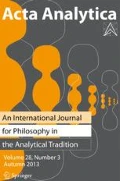Abstract
Many philosophers accept that a naturalistic reduction of meaning is in principle impossible, since behavioural regularities or dispositions are consistent with any number of semantic descriptions. One response is to view meaning as primitive. In this paper, I explore Brandom’s alternative, which is to specify behaviour in non-semantic but normative terms. Against Brandom, I argue that a norm specified in non-semantic terms might correspond to any number of semantic norms. Thus, his theory of meaning suffers from the very same kind of problem as its naturalistic competitors. It is not sufficient, I contend, merely that some norms be introduced into one’s account but that they be specified using intensional, semantic notions on a par with that of meaning. In closing, I counter Brandom’s reasons for resisting such a position, the most significant of which is that it leaves philosophers with nothing constructive to say about meaning.
Similar content being viewed by others
References
Baker, G. P. and Hacker, P. M. S. 1984. Scepticism, Rules and Language. Oxford: Blackwell.
Boghossian, P. 1989. “The Rule Following Considerations.” Mind 93: 507–49.
—— 2005. “Is Meaning Normative?” In Philosophy—Science—Scientific Philosophy, ed. A. Beckermann and C. Nimtz. Paderborn: Mentis.
Brandom, R. B. 1994. Making it Explicit. Cambridge, Massachusetts: Harvard University Press.
—— 1997. “Replies.” Philosophy and Phenomenological Research 57: 189–204.
—— 2000. Articulating Reasons. Cambridge, Massachusetts: Harvard University Press.
—— 2001. “Meaning, Normativity, and Intentionality.” Philosophy and Phenomenological Research 63: 587–609.
—— 2002. Tales of the Mighty Dead. Cambridge, Massachusetts: Harvard University Press.
Davidson, D. 2005. Truth, Language, and History. Oxford: Oxford University Press.
Glock, H-J. 2005. “The Normativity of Meaning Made Simple.” In Philosophy—Science—Scientific Philosophy, ed. A. Beckermann and C. Nimtz. Paderborn: Mentis.
Hale, B. 1997. “Rule-Following, Objectivity and Meaning.” In A Companion to the Philosophy of Language, ed. B. Hale and C. Wright. Oxford: Blackwell.
Hattiangadi, A. 2003. “Making it Implicit.” Philosophy and Phenomenological Research 66: 419–431.
—— 2006. “Is Meaning Normative?” Mind and Language 21: 220–40.
Horwich, P. 1998: Meaning. Oxford: Oxford University Press.
—— 2005. Reflections on Meaning. Oxford: Oxford University Press.
Jackson, F. 1998. From Metaphysics to Ethics. Oxford: Oxford University Press.
Kripke, S. 1982. Wittgenstein on Rules and Private Language. Oxford: Blackwell.
Laurier, D. 2005. “Pragmatics, Pittsburgh Style.” Pragmatics and Cognition 13: 141–160.
Loewer, B. 1997. “A Guide to Naturalizing Semantics.” In A Companion to the Philosophy of Language, ed. B. Hale and C. Wright. Oxford: Blackwell.
McDowell, J. 1998. Mind, Value, and Reality. Cambridge, Massachusetts: Harvard University Press.
—— 2002. “How Not to Read Philosophical Investigations.” In Wittgenstein and the Future of Philosophy, ed. R. Haller and K. Puhl. Vienna: ÖBV & HPT.
—— 2005. “Motivating Inferentialism.” Pragmatics and Cognition 13: 121–140.
Miller, A. 2000. “Horwich, Meaning and Kripke’s Wittgenstein.” Philosophical Quarterly 50: 161–174.
—— 2006. “Meaning Scepticism.” In The Blackwell Guide to the Philosophy of Language, ed. M. Devitt and R. Hanley. Oxford: Blackwell.
Moore, A. W. 1985. “Transcendental Idealism in Wittgenstein and Theories of Meaning.” Philosophical Quarterly 35: 134–155.
Railton, P. 2000. “A Priori Rules.” In New Essays on the A Priori, ed. P. Boghossian and C. Peacocke. Oxford: Oxford University Press.
Rosen, G. 1997. “Who Makes the Rules Around Here?” Philosophy and Phenomenological Research 57: 163–172.
Sellars, W. 1953. “Inference and Meaning” Mind 62: 318–338.
—— 1964. Science, Perception and Reality. London: Routledge.
Shapiro, L. 2004. “Brandom on the Normativity of Meaning.” Philosophy and Phenomenological Research 68: 141–160.
Strawson, P. F. 1992. Analysis and Metaphysics. Oxford: Oxford University Press.
Stroud, B. 2002. Meaning, Understanding, and Practice. Oxford: Oxford University Press.
Whiting, D. 2006. “Meaning-theories and the Principle of Humanity.” The Southern Journal of Philosophy 44.
-- 2007. “The Normativity of Meaning Defended.” Analysis 66.
-- Forthcoming: “Meaning, Norms, and Use: Critical Notice of Donald Davidson’s Truth, Language, and History.” Philosophical Investigations.
Wittgenstein, L. 1967. Philosophical Investigations 3rd ed., ed. G. E. M. Anscombe, R. Rhees and G. H. von Wright, trans. G. E. M. Anscombe. Oxford: Blackwell.
Wright, C. 2001. Rails to Infinity. Cambridge, Massachusetts: Harvard University Press.
Author information
Authors and Affiliations
Rights and permissions
About this article
Cite this article
Whiting, D. Between primitivism and naturalism: Brandom’s theory of meaning. Acta Anal 21, 3–22 (2006). https://doi.org/10.1007/s12136-006-1007-9
Received:
Issue Date:
DOI: https://doi.org/10.1007/s12136-006-1007-9


